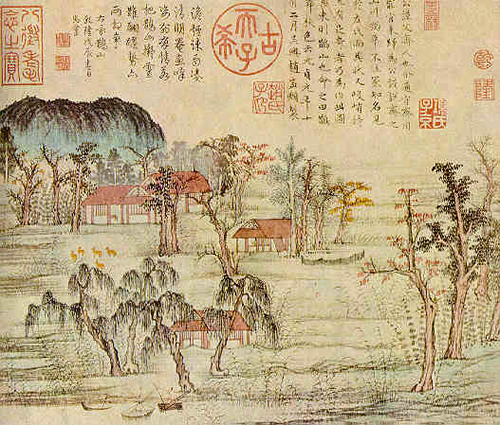
Autumn Colors on the Ch'iao and Hua Mountains by Zhao Mengfu (1254-1322), National Palace Museum, Taipei
Notwithstanding the aspects of their rule that were certainly negative for China, the Mongols did initiate many policies — especially under the rule of Khubilai Khan — that supported and helped the Chinese economy, as well as social and political life in China.
In order to ingratiate himself with Confucian China, for example, Khubilai restored the rituals at court — the music and dance rituals that were such an integral part of the Confucian ideology. He also founded ancestral temples for his predecessors — his father and Chinggis (Genghis) Khan (his grandfather) — in order to carry out the practices of ancestor worship that were so critical for the Chinese.
And in an even greater effort to ingratiate himself personally to the Chinese, Khubilai insisted on giving his second son, Jin Chin, a Chinese-style education. Confucian scholars tutored the young boy, and he was introduced to the tenets of both Confucianism and Buddhism.
Khubilai also set up institutions to rule China that were very familiar to the Chinese, adapting or borrowing wholesale many of the traditional governmental institutions of China. For example, the Six Ministries that had been responsible for carrying out policy were retained by Khubilai's government, as was the Secretariat, a decision-making body. And the provincial administrative structure that organized China into provinces, further divided into districts and counties and so on, was not changed. The Chinese, therefore, found much of the Yuan Dynasty's political structures to be familiar.
And finally, Khubilai's economic policies in China, at least initially, promoted the interests of China and were quite successful.